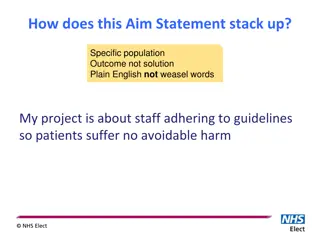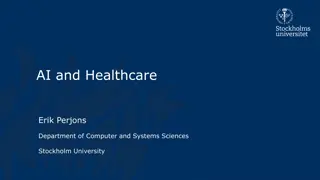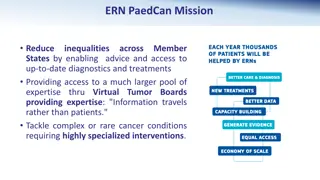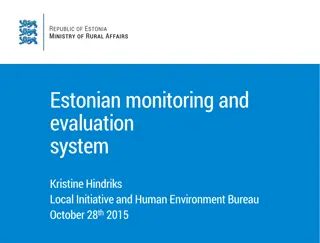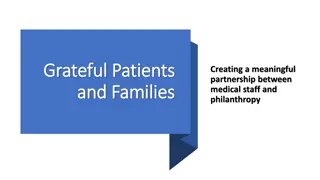Practical Challenges of Implementing AI in Healthcare Evaluation
This presentation discusses the practical challenges faced by healthcare organizations in evaluating AI-driven solutions. Agnieszka Sitarska, an MAS/MBA graduate from ETH Zurich, explores the aspects organizations should consider when assessing AI tools and providers. The framework developed focuses on internal and external evaluation aspects to guide organizations in making informed decisions.
Download Presentation

Please find below an Image/Link to download the presentation.
The content on the website is provided AS IS for your information and personal use only. It may not be sold, licensed, or shared on other websites without obtaining consent from the author. Download presentation by click this link. If you encounter any issues during the download, it is possible that the publisher has removed the file from their server.
E N D
Presentation Transcript
FGAI4H-J-037-A01 E-meeting, 30 September 2 October 2020 Source: ETH Zurich Title: Practical challenges of artificial intelligence in healthcare: building the evaluation framework for organizations - Presentation Purpose: Discussion Contact: Agnieszka Sitarska Switzerland Email: Sitarska.aga@gmail.com Abstract: This PPT contains a presentation of J-037.
Intro: Agnieszka Sitarska Recent graduate of MAS Management, Technology and Economics at ETH Zurich MAS Thesis: Practical challenges of AI in healthcare: building the evaluation framework for organizations Aspiring venture capitalist with a passion for digital health Early stage technology ventures Venture Capital Digital Health 2
Evaluation framework for AI-driven solutions for healthcare The organization (business) perspective Agnieszka Sitarska, MAS/MBA graduate Zurich, 30.09.2020
Research question: what aspects should healthcare organizations consider when evaluating AI-driven tools and providers? Pillar IGroundwork: Identify challenges of evaluating AI for healthcare in the recent literature (backup slide) Pillar II: Interviews with business practitioners Pillar III: Evaluation project Selecting a provider of an AI-driven digital service Represented profiles: Data science, digital services, medical, innovation, technology investors, business development Screening (20 companies) Preselection (top 5) Comparison (top 3) Synergy analysis (the winner) 4
The final framework comprises internal (A) and external-facing aspects (B) of evaluation Important phase at the very start! 5
1/6: Compliance Organizational departments involved in the evaluation: Procurement Regulatory Affairs Legal 6
2/6: Capabilities of the provider This cluster received the most attention from the interviewed business practitioners! A few extra criteria to be considered for startup companies Organizational departments involved in the evaluation: Procurement Data Science 7
3/6: Technology and training data Suitability to the defined use case is key! The type of AI algorithm was not deemed important, as long as it is state-of.the-art Organizational departments involved in the evaluation: Data Science IT 8
4/6: Design and User Experience (UX) Solution design and user experience are key to the adoption and adherence Interpretability features: specified confidence level, clarification of the output, rationale Organizational departments involved in the evaluation: Digital Services IT 9
5/6: Verification and clinical proof Testing data should be representative of the operational setting Ground truth Organizational departments involved in the evaluation: Data Science Medical/Clinical team 10
6/6: Integratability The solution must be a good overall fit in: IT infrastructure User journey Social context Organizational departments involved in the evaluation: Procurement IT / Digital Services Medical team 11
Recent literature on the evaluation of AI for healthcare Challen, R., Denny, J., Pitt, M., Gompels, L., Edwards, T., & Tsaneva-Atanasova, K. (2019). Artificial intelligence, bias and clinical safety. BMJ Quality and Safety, 28(3), 231-237. BMJ Publishing Group Magrabi, F., Ammenwerth, E., McNair, J., De Keizer, N., Hypp nen, H., Nyk nen, P., . . . Georgiou, A. (2019). Artificial Intelligence in Clinical Decision Support: Challenges for Evaluating AI and Practical Implications. Yearbook of medical informatics, 28(1), 128-134. NLM (Medline). Reddy, S., Allan, S., Coghlan, S., & Cooper, P. (2020, 3 1). A governance model for the application of AI in health care. Journal of the American Medical Informatics Association, 27(3), 491-497. Oxford University Press. Topol, E. (2019, 1 1). High-performance medicine: the convergence of human and artificial intelligence. Nature Medicine, 25(1), 44-56. Nature Publishing Group. Wiljer, D., & Hakim, Z. (2019, 12 1). Developing an Artificial Intelligence Enabled Health Care Practice: Rewiring Health Care Professions for Better Care. Journal of Medical Imaging and Radiation Sciences, 50(4), S8-S14. Yu, K., & Kohane, I. (2019, 3 1). Framing the challenges of artificial intelligence in medicine. 28(3), 238-241. Yu, K., Beam, A., & Kohane, I. (2018, 10 1). Artificial intelligence in healthcare. Nature Biomedical Engineering, 2(10), 719-731. Nature Publishing Group. (extra read about the existing evaluation frameworks in healthcare) Andargoli, S. R. (2017, 1 1). Health information systems evaluation frameworks: A systematic review. International Journal of Medical Informatics, 97, 195-209. Elsevier Ireland Ltd. - overview of the existing evaluation frameworks for Health Information Systems (HIS) 13
Challenges related to AI in healthcare emphasized in the literature Performance metrics - abstract to the medical/operational context, variability in the implementation approaches - no easy way to compare the providers Access to data - generally low availability, heterogeneity, fragmentation, adequacy of training data Gap in regulations - rules applicable to HIS do not keep up with the newest solutions and technologies (AI4Health is there to address this challenge!) Compliance and transparency - Medical device classification, post-market surveillance, data privacy, security and consent Operationalization - changing quality over time, fit in the workflow Social context - acceptance, understanding, adherence 14








